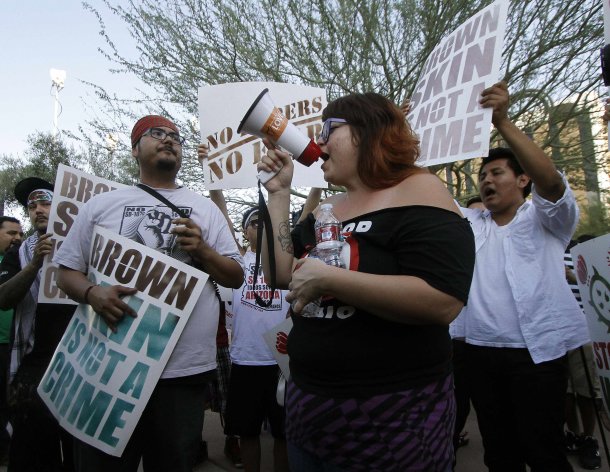Judge OKs contentious part of Ariz immigration law
By | Associated Press – 15 hrs agoPHOENIX (AP) — Arizona authorities can enforce the most contentious section of the state's heavily debated immigration law, according to a federal judge's ruling Wednesday regarding a section of the statute that critics have dubbed the "show me your papers" provision.
The ruling by U.S. District Judge Susan Bolton clears the way for police to carry out the requirement that officers, while enforcing other laws, question the immigration status of those they suspect are in the country illegally.
Arizona Gov. Jan Brewer hailed the ruling on what she called "the most critical section" of the state's immigration law.
Critics have assailed the provision as un-American, saying it paves the way for ethnic discrimination and racial profiling, providing officers a justification for stopping people based on how they look.
Alessandra Soler, executive director of the American Civil Liberties Union in Arizona, said the section of the law is "divisive" and will "lead to rampant racial profiling and prolonged detention for countless Latinos, a majority of whom are U.S. citizens and permanent residents."
Proponents say that's a misinterpretation of a law necessary to stop immigrants from illegally coming into the U.S. and using up scant resources. They say there's nothing wrong with being asked to provide identification proving legal status.
Brewer, a Republican, said the ruling "will empower state and local law enforcement, as part of a legal stop or detention, to inquire about an individual's immigration status when the officer has reasonable suspicion."
The provision has been at the center of a two-year legal battle that resulted in a U.S. Supreme Court decision in June upholding the requirement.After the nation's highest court weighed in, opponents asked Bolton to block the section of the law, arguing that it would cause systematic discrimination and unreasonably long detentions of Latinos if it's enforced.
Brewer's office, however, urged the judge to let the requirement go into effect, saying the law's opponents were merely speculating in their racial profiling claims. The Republican governor's office also said police have received training to avoid discriminatory practices and that officers must have reasonable suspicion that a person is in the country illegally to trigger the requirement.
In her ruling, Bolton said the court will not ignore the clear direction from the Supreme Court that the provision "cannot be challenged further on its face before the law takes effect." She reiterated the high court's interpretation that the law might be able to be challenged as unconstitutional on other grounds.
The Obama administration's case was based on the argument that federal immigration law trumped Arizona law. The challenge didn't confront racial profiling.
The Obama administration declared a measure of victory after the Supreme Court decision, as the court said local police cannot detain anyone on an immigration violation unless federal immigration officials say so.
President Barack Obama said in the aftermath of the ruling that police should not enforce the provision in a way that undermines civil rights.
"No American should ever live under a cloud of suspicion just because of what they look like," he said at the time.
Arizona's law, known as SB1070, was passed in 2010 amid voter frustration with the state's role as the busiest illegal entry point into the country. Five other states — Alabama, Georgia, Indiana, South Carolina and Utah — have adopted variations.
Shortly before the law was to take effect in July 2010, Bolton prevented police from enforcing the questioning requirement and other parts of the statute, ruling the Obama administration would likely succeed in its challenge.
Brewer, who signed the measure, appealed the ruling, lost at the 9th Circuit Court of Appeals and took her case to the Supreme Court.
Brewer's office said the law is expected to go into effect shortly.
Less controversial sections of the law have been in effect since late July 2010, but have rarely been used.
Lydia Guzman, a civil rights activist in Phoenix and leader of the group Respect Respecto, which tracks instances of racial profiling, said that if a higher court doesn't issue an emergency order stopping the provision from taking effect, her organization and others will be watching carefully.
If legal residents feel they are the victims of discriminatory treatment once the provision kicks in, Guzman said, "we want them to contact us. Those are the cases we are going to be taking to court."
The chief sponsor of SB1070, former state Senate President Russell Pearce, called Bolton's ruling a "huge win."
"The problem isn't the law," he said. "The problem is a broken political system and those that fail to keep their commitment to defend the law."
Maricopa County Sheriff Joe Arpaio said the ruling doesn't change what his office already has been doing. The only difference, he said, will be in how U.S. Immigration and Customs Enforcement officials respond to calls for pickup.
"Right now the only thing we can do is call ICE and see if they can pick them up under circumstances where we don't have a state charge," Arpaio said. "If we have a state charge, we'll book them into jail."
Lyle Mann, executive director of the Arizona Peace Officer Standards and Training Board, said law enforcement statewide has been trained on how to implement SB1070 and had been awaiting a start date.
Bolton, with her ruling also granted a preliminary injunction against a statute making it illegal to harbor individuals suspected of being in the country illegally.___
Associated Press writers Felicia Fonseca in Flagstaff, Ariz., and Nicholas Riccardi in Denver contributed to this report.


No comments:
Post a Comment